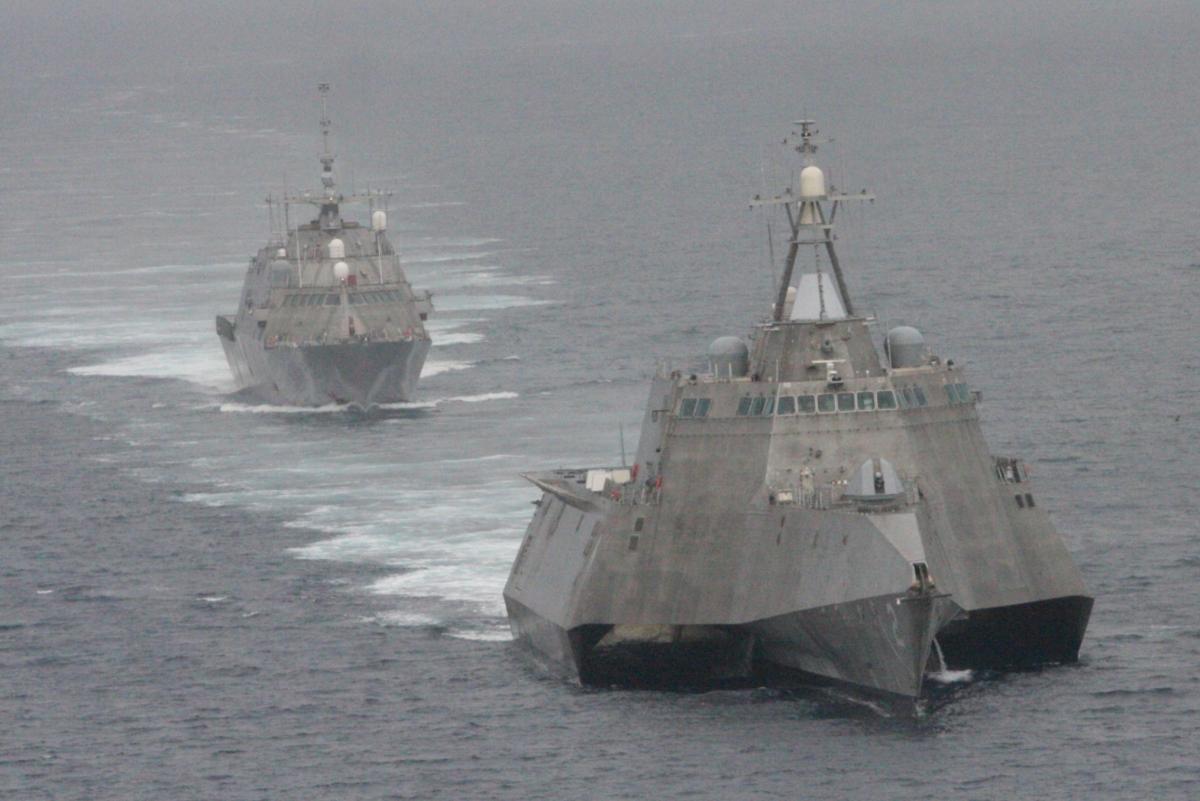
US Navy Photo.
This post has been updated to include additional information from Lockheed Martin regarding the impact of the contracting decision to its production line.
The Navy on Tuesday awarded Austal USA $691 million for two Littoral Combat Ships (LCS) and Lockheed Martin $441 million for one LCS and advance procurement funding for a second ship next year. Each company’s contract modification also included an option for another ship in Fiscal Year 2016 which would be the 11th for each builder under a block buy.
With its shipbuilding budget under pressure, the Navy last February broke from its four-a-year procurement strategy. Whereas both contractors had been producing two LCSs a year under a 20-ship, dual-yard block buy meant to stretch from FY 2010 to 2015, the last LCS in the original block buy would be deferred to FY 2016, with two additional ships added to the buy in 2016.
Navy spokesman Chris Johnson told USNI News that as the Navy worked through how to allocate the three FY 2015 ships, “the Navy and industry have consulted on schedules, performance to date and related matters. Through the negotiations with both industry teams, the Navy determined that the most cost-effective option was to fund Austal USA two FY 2015 ships, and Lockheed Martin one FY 2015 ship plus advance procurement for one FY 2016 ship.”
Lockheed Martin officials spoke to reporters Wednesday afternoon to explain the contract modification, which they say will have no impact on cost or schedule for its ships. The company essentially views the contract award as two FY 2015 ships, with the second ship’s funding coming in two increments instead of all upfront.
Neil King, Lockheed Martin’s director of business development for Littoral Ship Systems, said the company would begin buying equipment from its subcontractors with the $79 million in advance procurement funds, “and the remaining funds for that second FY ‘15 ship should be available to industry by the 31st of December of this year.”
“The $79 million is allowing us to procure the equipment we need, which is all you do in the first part of the year anyway when you get the ship awarded,” Lockheed Martin Vice President of Littoral Ship Systems Joe North added.
“So getting the second ship awarded by Dec. 31 allows us to maintain the production schedule for the second ship. It’s as simple as that, and the Navy committed to that as an option for us and it’s a deal we were willing to take. …. It works for us – as long as that second ship’s fully funded with the remaining effort by the 31st of December this year, it’s the equivalent of, it basically is two ships in ’15 with an option for another one in ‘16.”
Because Lockheed Martin works on the ships in six-month blocks, the deal comes down to the company keeping its current production schedule for three more ships before the flow is interrupted.
Austal, too, would have two ships in FY 2015 and one in FY 2016 before its workflow stops. Austal USA declined to comment on how future acquisition would affect the yard when contacted by USNI News.
Under the contract, Austal’s Mobile, Ala., yard will build the yet-to-be-named LCS-22 and 24, and Lockheed Martin subcontractor Marinette Marine in Marinette, Wisc., will build LCS-21. LCS-23 will be the deferred FY 2016 Lockheed Martin ship, Johnson said.
The money for the FY 2016 ships will not be obligated until the new fiscal year, which begins Oct. 1. Though Johnson said the Navy had not made any final decisions about FY 2016 acquisition, exercising the options with Austal and Lockheed Martin would extend the block buy – and its associated cost and schedule – through 2016.
The acquisition strategy for FY 2017 and 2018 has not yet been determined, USNI News understands, and no later than in FY 2019 the Navy is supposed to transition from the current LCS program to a frigate program.
North said the FY 2017 and 2018 ships would fall under a new Request for Proposals (RFP) from the Navy, but he didn’t know what the Navy’s acquisition strategy would be. King said “the Navy is looking at revising the acquisition strategy and presenting that in, I think, the May timeframe this year.”
In the contracts awarded Tuesday, Lockheed Martin will build its LCS for $362 million and Austal will build its ships for $345.5 million each. If all line items are funded, Lockheed will have earned $4.97 billion and Austal $4.78 billion over the course of the block buy for 10 ships each, plus integration and testing of ship systems, long-term engineering support, configuration management and other technical services, USNI News understands.
Currently, USS Coronado (LCS-4) is conducting her Post Shakedown Availability after being commissioned in April 2014. Milwaukee (LCS-5) and Jackson (LCS-6) are preparing for their trials and delivery. Charleston (LCS-18) started construction last month, and LCSs 7 through 17 are in various stages of construction.





